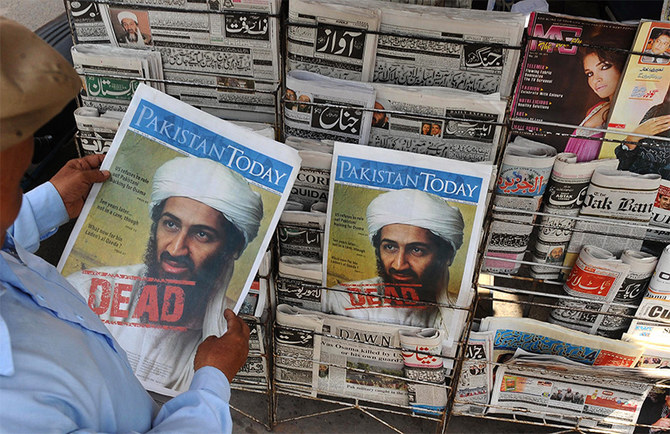ABBOTTABAD: Children play cricket in a patch of scorched grass and scattered rubble in Abbottabad — all that remains of the final lair of the man who was once the most wanted person on the planet.
It was in this Pakistani city that Osama bin Laden was killed in the clandestine “Operation Geronimo” raid by US Navy Seals in the early hours of May 2, 2011.
The operation had global repercussions and dented Pakistan’s international reputation — exposing contradictions in a country that had long served as a rear base for Al Qaeda and its Taliban allies while suffering from the effects of terrorism.
Bin Laden had been living in seclusion for at least five years in Abbottabad, hidden behind the high walls of an imposing white building less than two kilometers from a renowned military academy.
“It was a very bad thing for this place and for the whole country,” said Altaf Hussain, a retired schoolteacher, walking down an alley alongside Bin Laden’s former residence. “By living here, Osama gave this city a bad reputation.”
The raid caught Pakistan between a rock and a hard place.
Officials could deny knowing he was there — but in doing so they would effectively be admitting to a shocking intelligence failure.
They could also have admitted that the world’s most infamous fugitive was under their protection, but that would concede being powerless to prevent Washington from carrying out such a daring raid on sovereign soil.
They opted for the former, but the US operation reinforced an already strong anti-American sentiment among a population tired of the heavy financial and human toll paid for the war on terror — and Islamabad’s alliance with Washington after the September 11, 2001 attacks.
At the time of his death, Bin Laden’s local popularity had waned.
“Before, I remember that people named their children Osama, even in my village,” said Pakistani journalist Rahimullah Yusufzai, a specialist in militant networks.
Bin Laden’s death did not stop militancy from spreading in Pakistan, and conservative religious movements became even more influential.
Over the next three years, several terror groups — foremost among them the Pakistani Taliban — carried out bloody attacks and established strongholds in northwestern tribal areas bordering Afghanistan.
A military campaign launched in 2014 helped bring down the violence, although a recent series of minor attacks has raised fears that extremists are regrouping.
Without its charismatic leader, Al Qaeda “survived, but barely” and is no longer able to launch major attacks in the West, says Yusufzai.
The group is also no longer “a great threat to Pakistan,” believes Hamid Mir — the last journalist to interview Bin Laden face-to-face — although other groups such as the Islamic State, or Daesh, remain so.
He said while the Al-Qaeda founder is still seen as a “freedom fighter” by some, many also acknowledge him as “a bad person who killed innocent people and caused destruction — not only in Pakistan, but in many countries, in violation of the teachings of Islam.”
Bin Laden nonetheless retains an aura in radical circles.
“He is alive in the heart of every Taliban,” said Saad, an Afghan Taliban official living in the northwest Pakistani city of Peshawar.
Pakistani Prime Minister Imran Khan caused a scandal two years ago by telling parliament bin Laden had died a “martyr” — a noble demise in the Islamic world.
Even in Abbottabad, a prosperous and largely tolerant medium-sized city, there is ambiguity toward Bin Laden, whose house was razed in 2012 by authorities so that it would not become a memorial.
“In this street, there are differences of opinion,” says teenage former Neighbour Numan Hattak. “Some say he was good, others that he was bad.”
10 years after his death, Osama bin Laden still haunts Pakistan
https://arab.news/8mjcx
10 years after his death, Osama bin Laden still haunts Pakistan
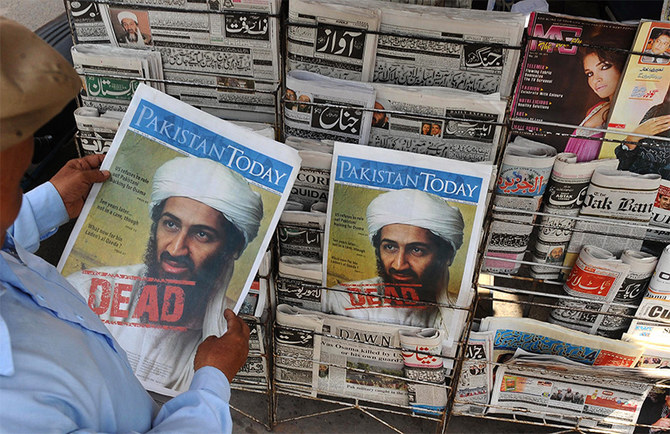
- Bin Laden was killed in the clandestine “Operation Geronimo” raid by US Navy Seals in Abbottabad on May 2, 2011
- Today, there is ambiguity toward Bin Laden in the city where his house was razed so it wouldn’t become a memorial
Pakistan confers military award on Turkish land forces commander
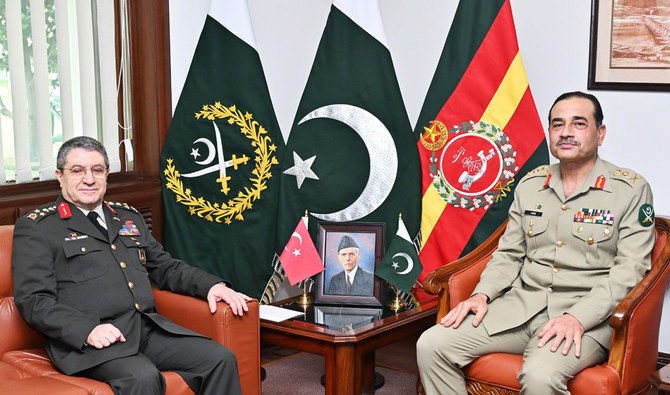
- President Asif Ali Zardari conferred the award at a special investiture ceremony held in Islamabad
- General Selcuk Bayraktaroglu, who is currently visiting Pakistan, also met Army Chief Gen Asim Munir
ISLAMABAD: Pakistan on Sunday conferred a military award, Nishan-i-Imtiaz, on Commander of the Turkish Land Forces, General Selcuk Bayraktaroglu, during his visit to Islamabad, Pakistani state media reported.
Pakistan President Asif Ali Zardari bestowed the Turkish general with the award at a special investiture ceremony held at the Presidency in Islamabad, the state-run Radio Pakistan broadcaster reported.
“The award was conferred upon him in recognition of his illustrious services and contribution toward strengthening Pakistan-Turkiye defense relations,” the report read.
The investiture ceremony was attended by foreign diplomats and high-ranking military officials.
Separately, General Bayraktaroglu called on Pakistan’s army chief, General Asim Munir, and General Sahir Shamshad Mirza, chairman of the Joint Chiefs of Staff Committee, the Pakistani military said.
During his meeting with Gen Munir, matters of mutual interest and measures to further enhance bilateral defense cooperation were discussed, according to the Inter-Services Public Relations (ISPR), the Pakistani military’s media wing.
“Both sides expressed satisfaction over deep-rooted relations between the two countries, based on historic, cultural and religious affinity,” the ISPR said.
“COAS emphasized the need to further strengthen existing military to military cooperation between the two Armed Forces.”
During the meeting, the ISPR added, the visiting dignitary appreciated the role of Pakistan Army in ensuring peace and stability in the region.
Pakistan court hands life sentences to four in 2018 murder of lawmaker
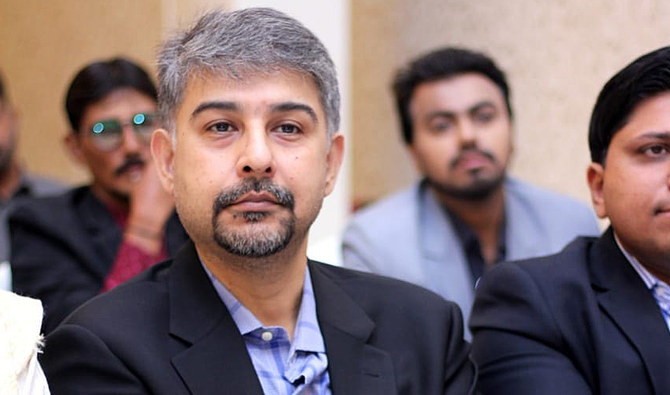
- The accused were convicted of aiding, abetting, reconnaissance, and facilitating murder of Syed Ali Raza Abidi
- Court suspends proceedings against prime accused, citing Supreme Court ruling that prohibits judgments in absentia
KARACHI: A Pakistani court on Monday handed life sentences to four accused who were convicted of aiding, abetting, reconnaissance and facilitating the murder of a Pakistani lawmaker in the southern city of Karachi in 2018.
Ali Raza Abidi, a businessman and politician, who belonged to the Muttahida Qaumi Movement-Pakistan (MQM-P) party, was shot dead outside his residence in the Defense Housing Authority (DHA) area of Karachi.
Police had registered a case against the suspects in the Gizri police station under the Anti-Terrorism Act.
“The evidence shows that all the accused persons in furtherance of their common intention are involved in the commission of murder of Syed Ali Raza Abidi and they are equally responsible for the act,” Zeeshan Akhter Khan, the Anti-Terrorism Court judge, stated in his detailed judgment.
The convicts, Muhammad Farooq, Muhammad Ghazali, Abu Bakar and Abdul Haseeb, were also fined under various sections of the Pakistan Penal Code. They can appeal the verdict within 15 days.
The court, citing a Supreme Court judgment, said since a case against absconding accused, Bilal, Hasnain, Ghulam Mustafa and Faizan, could not be proceeded in absentia, it was placed on dormant status until their arrest or appearance before the court.
Abidi was elected as a Member of the National Assembly (MNA) on the ticket of the MQM-P in the 2013 general election. He, however, quit the MQM-P following the party’s formation of an alliance with the rival Pak Sarzameen Party (PSP).
Despite briefly rejoining the MQM-P in December 2017, Abidi ultimately parted ways with the party in September 2018. He was killed months later on December 25, 2018.
Pakistani PM meets Malaysia’s Ibrahim on WEF sidelines, invites on official Islamabad visit
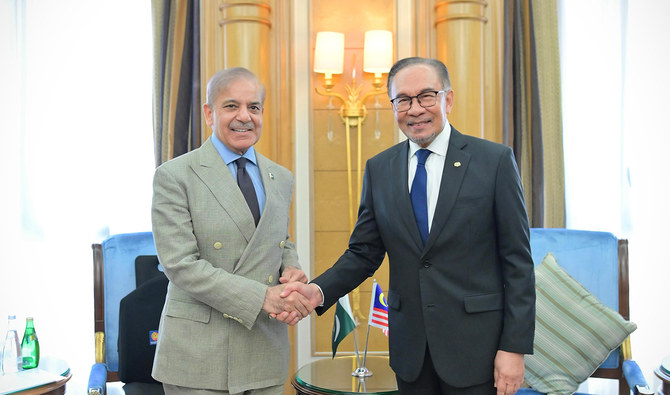
- Shehbaz Sharif was in Riyadh to attend a WEF special meeting on Global Collaboration, Growth and Energy for Development on April 28-29
- The Pakistan PM invited Malaysian traders and businessmen to visit Pakistan to discuss expansion of bilateral trade, investment relations
ISLAMABAD: Pakistan’s Prime Minister Shehbaz Sharif on Monday met his Malaysian counterpart Anwar Ibrahim in Riyadh and invited him to visit the South Asian country, Sharif’s office said.
The two leaders met on the sidelines of a two-day World Economic Forum (WEF) summit in Saudi Arabia’s capital of Riyadh, according to PM Sharif’s office.
During the meeting, both sides agreed to further develop relations.
“The two leaders also agreed to hold the next meeting of the Joint Ministerial Commission in Islamabad soon,” Sharif’s office said in a statement.
“The prime minister reiterated his invitation to Malaysian Prime Minister Anwar Ibrahim to pay an official visit to Pakistan.”
The two leaders discussed bilateral ties in the fields of education, science and technology, livestock and trade, and vowed to further enhance cooperation in the future, according to the statement.
PM Sharif also invited Malaysian traders and businessmen to visit Pakistan to discuss the expansion of bilateral trade and investment relations.
The Pakistan prime minister was in Riyadh to attend the WEF special meeting on Global Collaboration, Growth and Energy for Development on April 28-29.
Sharif spoke about Gaza at the closing plenary of the two-day summit and held several bilateral meetings, particularly with Saudi officials, during the visit.
No peace in the world without ceasefire in Gaza, Pakistani PM says at WEF
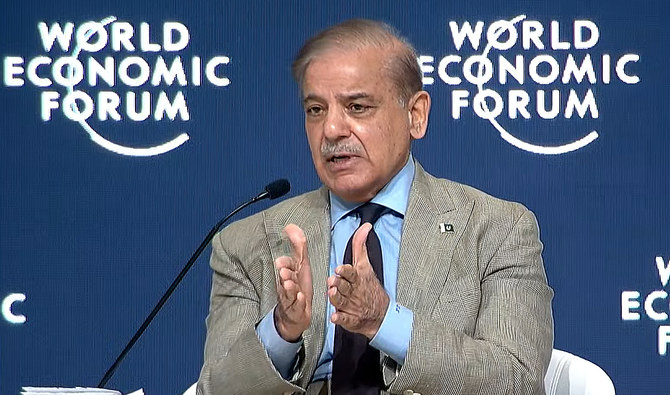
- Pakistan does not recognize Israel and calls for an independent Palestinian state based on pre-1967 borders
- Sharif is in Riyadh for two-day World Economic Forum summit on growth, has met top Saudi leaders on sidelines
ISLAMABAD: Pakistan Prime Minister Shehbaz Sharif said on Monday there could be no peace in the world without a permanent ceasefire in Gaza, as Israel’s attacks on the besieged Palestinians territory continue.
The statement came during the prime minister’s address at the closing plenary of a special two-day World Economic Forum (WEF) summit held in Riyadh, with a focus on global collaboration, growth and energy for development.
Israel’s air and ground assault on Gaza has killed about 34,500 Palestinians, according to Palestinian health authorities. The enclave is also in the grips of severe shortages of food, fuel and medicine since October 7 when the war started after attacks by Hamas on Israel.
“The world will not be in peace unless there is permanent peace in Gaza,” PM Sharif said.
Pakistan does not recognize the state of Israel and calls for an independent Palestinian state based on “internationally agreed parameters” and the pre-1967 borders with Al-Quds Al-Sharif as its capital.
Sharif said conflicts in Gaza, Ukraine and elsewhere had led to inflation globally, which was “breaking the back of developing countries.”
Sharif arrived in Riyadh on Saturday for the WEF special meeting on Global Collaboration, Growth and Energy for Development on April 28-29.
The conference has convened more than 700 participants, including key stakeholders from governments and international organizations, business leaders from the World Economic Forum’s partner companies, as well as Young Global Leaders, experts and innovators.
During his address, the Pakistan prime minister also thanked Saudi Arabia and other friendly countries for supporting Pakistan through difficult times.
“I have to acknowledge from the core of my heart the support we have been given and received from the Saudi leadership,” he said. “I think, a friend in need is a friend in deed and we will never be able to repay back to them what they have done to Pakistan in difficult times.”
Sharif said his government was going for “deep-rooted structural reforms” to put the country on the path to economic recovery.
“It will hit me as prime minister, obviously,” he said. “But ladies and gentlemen, without that nothing will happen.”
Pakistan is facing a chronic balance of payments crisis, with nearly $24 billion to repay in debt and interest over the next fiscal year, three-time more than its central bank’s foreign currency reserves.
The country is in talks with the International Monetary Fund (IMF) to secure a new loan program after its ongoing $3 billion program expires this month.
Pakistan, Saudi Arabia to take ‘concrete measures’ to boost bilateral trade — PM Sharif
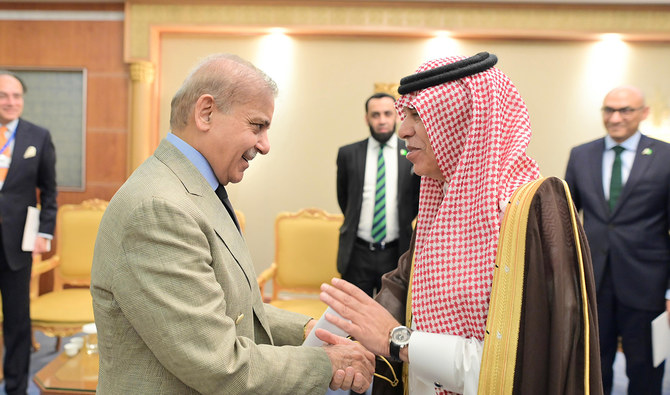
- Statement came after Shehbaz Sharif’s meeting with Saudi Commerce Minister Majid Al-Qasabi on WEF sidelines
- The WEF has convened a special meeting in Riyadh on global collaboration, growth and energy for development
ISLAMABAD: Prime Minister Shehbaz Sharif on Monday said Pakistan and Saudi Arabia would be taking “concrete measures” to boost the volume of bilateral trade between the two countries, Pakistani state media reported.
The statement came after PM Sharif’s meeting with Saudi Minister of Commerce Majid Al-Qasabi on the sidelines of a special meeting of the World Economic Forum in Riyadh.
Sharif informed the Saudi minister about the role of the Special Investment Facilitation Council (SIFC), set up in June, in promoting and facilitating the foreign investment.
“The Saudi minister told the prime minister that on the directives of Saudi Crown Prince and Prime Minister Mohammed bin Salman, the Kingdom was prioritizing trade and investment in Pakistan,” the state-run APP news agency reported.
“The Saudi minister said that the targets were being set to take the bilateral ties to a new height within one or one-and-half years.”
On the occasion, PM Sharif noted that Pakistani nationals had played a significant role in the progress and prosperity of Saudi Arabia, according to the report.
The Saudi commerce minister stressed the need to further promote Pakistan-Saudi Arabia ties among the youth.
Sharif arrived in Riyadh on Saturday to attend the WEF summit on global collaboration, growth and energy on April 28-29. The conference has convened more than 700 participants, including key stakeholders from governments and international organizations, business leaders from the WEF partner companies as well as young global leaders, experts and innovators.
After being on a number of panels at the WEF event on Sunday and holding several sideline meetings, the prime minister will address the closing plenary of the summit today, Monday, and also meet a number of top Saudi officials.
On Sunday, Sharif attended a Special Dialogue and Gala Dinner hosted by Crown Prince Mohammed bin Salman where they discussed bilateral ties as well as regional issues including the war in Gaza.
Sharif’s meeting with the crown prince took place less than a week after a high-powered delegation, headed by Saudi Foreign Minister Faisal bin Farhan, visited Pakistan to discuss investments.
“To continue the discussion, the Prime Minister said that he has brought with him a high-powered delegation to Riyadh, including key ministers responsible for investment, so that follow-up meetings could take place between relevant officials,” the Pakistani Prime Minister’s Office said.
Sharif reiterated his invitation to the Saudi crown prince for an official visit to Pakistan at his earliest convenience, the PMO added.
Pakistan and Saudi Arabia enjoy strong trade, defense and cultural ties. The Kingdom is home to over 2.7 million Pakistani expatriates and serves as the top source of remittances to the cash-strapped South Asian country.
Both Pakistan and Saudi Arabia have been closely working to increase bilateral trade and investment deals, and the Kingdom recently reaffirmed its commitment to expedite an investment package worth $5 billion.


